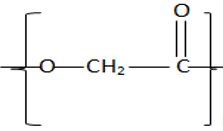This set of Tissue Engineering Questions and Answers for Experienced people focuses on “Synthetic Polymers for Biomaterial Processing”.
1. ____________ polymers are those which are human-made polymers.
a) Hydrogel
b) Biodegradable
c) Natural
d) Synthetic
View Answer
Explanation: Synthetic polymers are those which are human-made polymers. Polymers are those which consist of repeated structural units known as monomers. E.g., polythene has ethene as a monomeric unit.
2. Synthetic polymers are sometimes referred as __________
a) plastics
b) metals
c) ceramic
d) jelly
View Answer
Explanation: Synthetic polymers are sometimes referred as “plastics”, of which the well-known ones are nylon and polyethylene. The polymers which are formed by linking monomer units, without the any change of material, are known to as addition polymers or also called as chain-growth polymers. All these are said to be synthetic polymers.
3. Non-biodegradable- Synthetic polymers are made from _____________
a) petroleum
b) lipids
c) carbohydrates
d) proteins
View Answer
Explanation: Many polymers that are commonly found in households are non-degradable as they are petroleum based polymers. In order to control the environmental issues arising due to these polymers, bioplastics have been introduced as an alternative, these are biodegradable in nature.
4. Synthetic materials owing to the bioactive properties have better interactions with the cells which allow them to enhance the cells’ performance in a biological system.
a) TRUE
b) FALSE
View Answer
Explanation: Natural materials owing to the bioactive properties have better interactions with the cells which allow them to enhance the performance of the cell in a biological system. Synthetic biomaterial guidance provided by biomaterials may facilitate the restoration of the structure and function of damaged or diseased tissues.
5. Which of the following is an example of Synthetic polymer?
a) Polylactic acid
b) Dextran
c) Chitin
d) Amylose
View Answer
Explanation: Polylactic acid is an example of synthetic polymers. Dextran, chitin and amylose are examples of natural polymers.
6. Polyesters are a kind of Natural polymer.
a) TRUE
b) FALSE
View Answer
Explanation: Polyesters are the largest family of synthetic materials under study. The most commonly used polyesters are poly (lactic acid) (PLA), poly (α-hydroxy acids), poly (glycolic acid) (PGA) etc.
7. Synthetic polymers can be manufactured with additional chemical functional groups to induce tissue regeneration.
a) TRUE
b) FALSE
View Answer
Explanation: Synthetic polymers are attractive because they can be fabricated into various shapes. Synthetic polymers can be manufactured with additional chemical functional groups to induce tissue regeneration.
8. The following is the monomer for ___________

a) Poly (lactic acid)
b) Poly (glycolic acid)
c) Polythene
d) Polystyrene
View Answer
Explanation: The monomer for poly (lactic acid) is (OCH(CH3)CO). The monomer for poly (glycolic acid) is (OCH2CO). The monomer for polythene is (CH2CH2). The monomer for polystyrene is (C8H8).
9. Polylactides are non-biodegradable in nature.
a) TRUE
b) FALSE
View Answer
Explanation: Generally, the degradation of polylactides involves random hydrolysis of the ester bonds. Poly (lactic acid) degrades to form lactic acid which is normally present in the body.
Sanfoundry Global Education & Learning Series – Tissue Engineering.
To practice all areas of Tissue Engineering for Experienced people, here is complete set of 1000+ Multiple Choice Questions and Answers.
If you find a mistake in question / option / answer, kindly take a screenshot and email to [email protected]- Check Biotechnology Books
- Check Tissue Engineering Books
- Practice Biotechnology MCQs
- Apply for Biotechnology Internship
